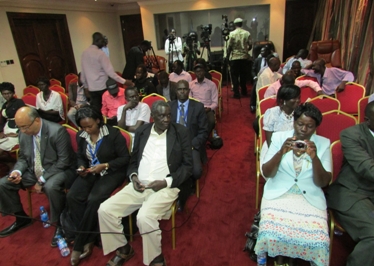Freedom of expression essential for peace in S: Sudan: UN report
February 24, 2018 (JUBA) – Genuine reconciliation and lasting peace will only be achieved in South Sudan if people are free and safe to express their opinions regardless of their ethnic or political affiliations, the United Nations said in a new report.

Co-authored by the UN Mission in South Sudan (UNMISS) and the UN Human Rights Office, the report identifies 60 verified incidents which violate the legitimate right to freedom of expression of 102 victims, including 17 women, in the period from July 2016 to December 2017.
Incidents include the killing of two people, the arbitrary arrest and detention of 58 others, 16 people dismissed from their jobs, the closure or suspension of three media houses, censorship of newspaper articles and the blocking of websites. Those targeted were seen to be critical of the Government, tarnishing the country’s reputation, or dealing with issues deemed sensitive.
“It is vital that the voices of all the people of South Sudan are heard so that genuine, inclusive, and durable peace can be achieved,” said the Special Representative of the Secretary-General and Head of UNMISS, David Shearer. “All parties to the conflict must respect people’s right to freedom of expression regardless of their ethnicity, beliefs or political views.”
The report found that Government security forces, including the National Security Service (NSS), Sudan People’s Liberation Army (SPLA) and the South Sudan National Police Service (SSNPS), were responsible for two-thirds of the verified cases.
It further observed that the NSS’ broad powers of surveillance, arrest and detention, including the embedding of its officers in some newspaper printing establishments, meant that people were deterred from participating and discussing the state of the country or human rights. It has led to a growing climate of self-censorship.
According to the report, only violations within the government-controlled territories were able to be verified in the report because of insecurity and access restrictions in Opposition-held areas.
The report also acknowledges efforts by the Government, civil society, and other stakeholders to promote an inclusive and safe environment for freedom of expression and democratic dialogue, including the release of political activists and journalists from prolonged and arbitrary detention.
After five years of ongoing conflict in South Sudan, reconciliation processes are underway at the international level through the High Level Revitalization Forum in Addis Ababa, Ethiopia. At a more grassroots level, peace talks are taking place through the National Dialogue process. Given the importance of these initiatives and other peace efforts, it is vital that civil society actors, journalists and other individuals and entities such as media houses or associations can operate freely without censorship, harassment or being threatened.
Many victims said they had not lodged formal complaints because of fear of reprisals by powerful people and a lack of trust in institutions including law enforcement and the judiciary.
“South Sudan’s conflict, with widespread human rights violations and abuses committed by all parties, has inflicted untold suffering on millions. Freedom of opinion and expression are not luxuries but essential to bring about peace and development, and to build a resilient and participative society,” said UN High Commissioner for Human Rights Zeid Ra’ad Al Hussein.
Meanwhile, the report recommended amendment of the legislation to decriminalize defamation and ensure that powers given to security forces do not infringe on the legitimate right to freedom of expression, strengthening of mechanisms to combat hate speech, supporting the training of journalists and state agencies and ensuring the Media Authority is fully operational, independent and adequately resourced.
(ST)
